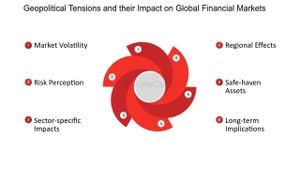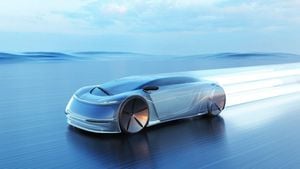The electric vehicle (EV) market stands at a fascinating crossroads, where acceleration is visible on one front, yet roadblocks loom large on another. The dynamics of this industry, which seemed ready to soar, now find themselves mired in challenges as political sentiments shift and technological adoption takes time to catch up. Recently, discussions around federal funding, production capabilities, and consumer reluctance have taken center stage, driving questions about the future of electric mobility.
Rivian, known for its rugged and premium EVs, has attracted considerable attention, primarily due to the sizeable $6.6 billion loan extended by the Biden administration intended to facilitate the establishment of its manufacturing plant in Stanton Springs, Georgia. This financial support appeared to be part of the broader strategy to bolster domestic EV production and job creation, but critics are raising eyebrows. Notably, Vivek Ramaswamy, who is slated to lead the Department of Government Efficiency (DOGE) under the incoming Trump administration, has publicly derided the loan, urging scrutiny of such financial interventions.
Ramaswamy argued, "Biden is forking over $6.6B to EV-maker Rivian to build a Georgia plant they’ve already halted," indicating suspicions of political maneuvering aimed at challenging Tesla and its CEO Elon Musk. The critique hinges on the steep cost per job created, projected at $880,000, which some deem excessive, particularly against Rivian's backdrop of financial struggles and profitability challenges.
Rivian's ambitions have faced headwinds, exemplified by the halt of their Georgia plant construction. While Rivian's offerings, including the R1T pickup and the R1S SUV, have made waves with consumers, the company has struggled to turn profitable. Rivian's reported decline of 48% year-to-date reflects the volatility within the EV market, amplifying skepticism around the sustainability of its business model. The quest for profitability has prompted Rivian to pivot production strategies and explore new supplier relationships, all with the target to achieve “a modest” positive gross profit by the close of Q4 2024.
The broader picture shows the vast disparity between the booming EV sales figures reported in countries like China, where favorable policies and infrastructure are rapidly advancing the EV agenda, compared to the stagnation presently experienced across the U.S. and Europe. Here, carmakers and governments struggle to meet years-old pledges about affordability and community charging infrastructure.
Consumers leading the charge for electric vehicle ownership are increasingly expressing apprehension, largely due to the ranges and costs associated with EVs. The average EV price has outpaced market expectations, with high acquisition costs deterring eco-conscious buyers from making the switch. Although global battery production is ramping up alongside technological advancements promising longer ranges, consumers are still wary. Reports indicate many potential buyers remain hesitant due to concerns over range anxiety, affordability, and the availability of charging stations.
The EV market's future will depend heavily on innovative solutions addressing these pivotal concerns. To this end, automakers are exploring new technologies for more efficient batteries and are attempting to improve the network of charging stations to create more seamless refueling experiences for electric car owners. The collaboration between tech companies and legacy automakers is expected to drive substantial breakthroughs.
Despite these innovations, political dynamics will also play their part. The incoming Trump administration's outlook, particularly its focus on reducing regulatory burdens and questioning prior financial assistance measures, might impose stricter oversight on federal funds allocated to the EV sector. Resistance to what some view as 'corporate welfare' could reshape how funding for future EV innovation is structured, as economic viability becomes more pronounced than political expediency.
Industry experts indicate the necessity of balancing investment and innovation with environmental strategies, especially as corporate commitments toward sustainable practices face intense scrutiny. The fallout from governmental funding decisions, especially when perceived as politically motivated, poses unique challenges for automakers like Rivian aiming to align their growth strategies with sustainable principles.
Rivian's situation encapsulates the electric vehicle industry's potentials and pitfalls, bringing to light the complex interplay among technological advancements, consumer behavior, and political climates. With Rivian racing to regain momentum amid political scrutiny and consumer skepticism, the path forward for EV manufacturers will require adaptability, responsiveness to market needs, and innovative approaches to overcoming the prevalent cost and range concerns.
The road to wider EV adoption hinges not only on technological prowess but also on governmental stances and societal readiness to embrace this transition. While the aspirations remain high, electrifying the automotive market may force both consumers and businesses to re-evaluate their strategies amid fluctuated support and market pressures.



